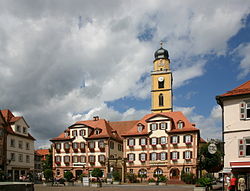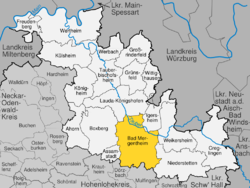Mergentheim
| Bad Mergentheim | ||
|---|---|---|

Market square
|
||
|
||
| Coordinates: 49°30′0″N 9°46′0″E / 49.50000°N 9.76667°ECoordinates: 49°30′0″N 9°46′0″E / 49.50000°N 9.76667°E | ||
| Country | Germany | |
| State | Baden-Württemberg | |
| Admin. region | Stuttgart | |
| District | Main-Tauber-Kreis | |
| Government | ||
| • Lord Mayor | Udo Glatthaar (CDU) | |
| Area | ||
| • Total | 129.97 km2 (50.18 sq mi) | |
| Elevation | 206 m (676 ft) | |
| Population (2015-12-31) | ||
| • Total | 23,064 | |
| • Density | 180/km2 (460/sq mi) | |
| Time zone | CET/CEST (UTC+1/+2) | |
| Postal codes | 97980 | |
| Dialling codes | 07931 (primarily), 07930, 07932, 07937, 07938 (boroughs) | |
| Vehicle registration |
TBB, MGH MGH (registered again) |
|
| Website | www.bad-mergentheim.de | |
TBB, MGH
Bad Mergentheim (![]() listen ; Mergentheim until 1926) is a town in the Main-Tauber-Kreis district in the German state of Baden-Württemberg. It has a population of around 23,000. An officially recognized spa town since 1926, Bad Mergentheim is also known as the headquarters of the Teutonic Order from 1526 until 1809.
listen ; Mergentheim until 1926) is a town in the Main-Tauber-Kreis district in the German state of Baden-Württemberg. It has a population of around 23,000. An officially recognized spa town since 1926, Bad Mergentheim is also known as the headquarters of the Teutonic Order from 1526 until 1809.
Since administrative reform in the 1970s the following villages have been part of the municipality: Althausen (pop. 600), Apfelbach (350), Dainbach (370), Edelfingen (1.400), Hachtel (360), Herbsthausen (200), Löffelstelzen (1,000), Markelsheim (2,000), Neunkirchen (1,000), Rengershausen (480), Rot (260), Stuppach (680), Wachbach (1,300)
Mergentheim is mentioned in chronicles as early as 1058, as the residence of the family of the counts of Hohenlohe. The brothers Andreas, Heinrich and Friedrich von Hohenlohe joined the Deutscher Orden (Teutonic Order) in 1219 and gave their two castles near Mergentheim to the order. One was abandoned, the other became the seat of the local Komtur (commander) of the order. Following the order's conquest of East Prussia and part of Livland in the 1230s, in 1309 the Grand Master of the order moved to the Marienburg. In 1340 Mergentheim was awarded town privileges. It rapidly became the most important of the eleven commanderies of the Teutonic Order. The Deutschmeister, highest ranking member inside the Holy Roman Empire (to which Prussia did not belong) moved his seat to Mergentheim in 1525 after his castle at Hornberg/Neckar had been destroyed by peasants. That same year, Grand Master Albrecht von Zollern-Brandenburg resigned his position, left the order, introduced Reformation, married and – supported by his liege lord the King of Poland – turned the order's eastern territories into a temporal duchy. The rulers of the order in Germany, now styling themselves Hoch- und Deutschmeister, then made Mergentheim the order's new headquarters and expanded the castle into a palatial residence. Over the next centuries, the town served as the centre of the order's southern German territories much like the residence town of any ruling prince. Some grand masters, like Archduke Leopold Wilhelm of Austria (1614-62), who in his 21 years in that role never once set foot in the town, were hardly ever present. Others, like Maximilian Franz (1756-1801), a son of Maria Theresa, loved the place. For the order's general chapter in 1791 he brought the orchestra of the Archbishopric of Cologne, including one Ludwig van Beethoven on viola. Mergentheim retained this role until the dissolution of the order in the countries of the Rheinbund in 1809 by Napoleon.
...
Wikipedia



